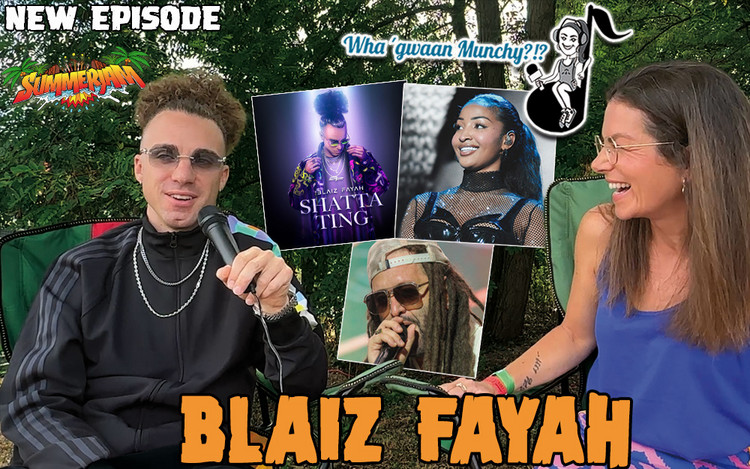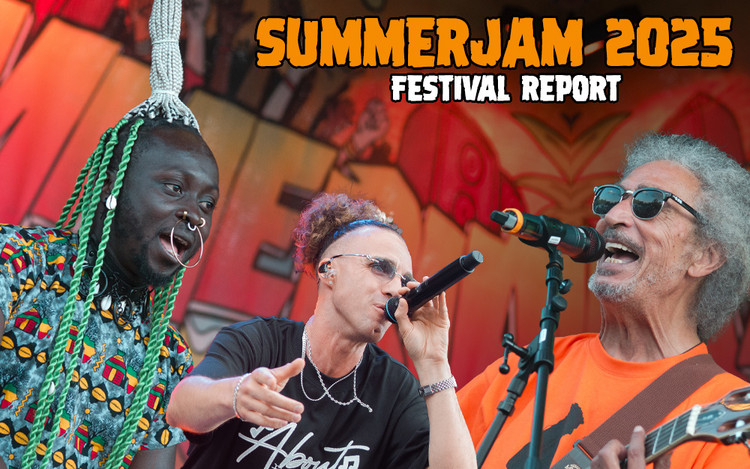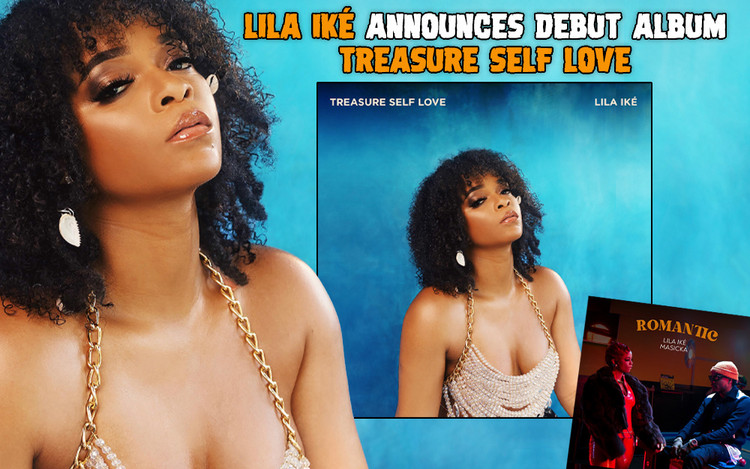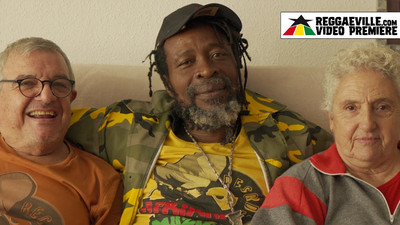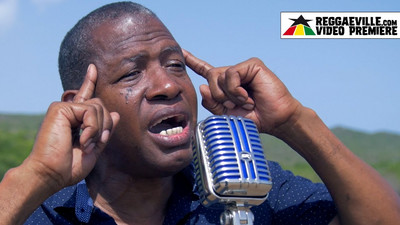Inna De Yard ADD
Interview with Peter Webber - Going Inna De Yard
06/28/2019 by Angus Taylor
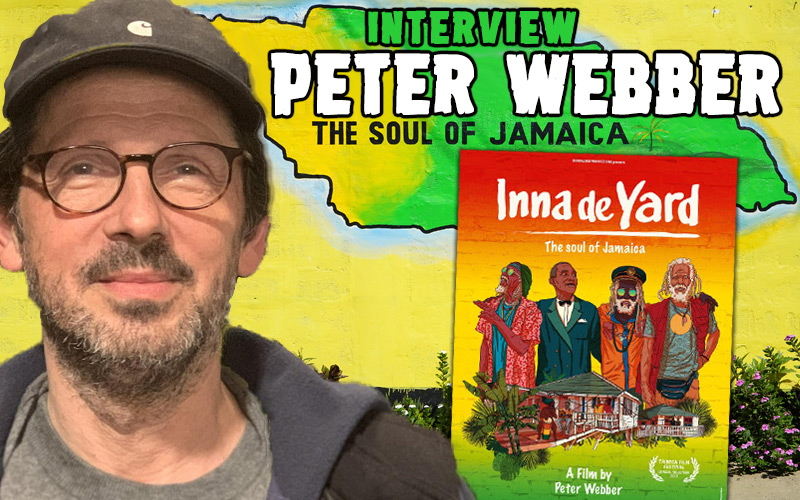
Musically, Jamaica punches above its weight in proportion to its population. And likewise, films about Jamaican music - from The Harder They Come, to Rockers, to Babylon - have made an international impact well beyond their budgets.
This year sees the release of the latest in a distinguished line of reggae features - the documentary Inna De Yard. Helmed by British director Peter Webber (Girl With The Pearl Earring, Hannibal Rising), Inna De Yard tells the story of the group of veteran and younger Jamaican musicians who tour acoustically under the same name. Shot on locations in Jamaica and France, it stars lead veterans Cedric Myton, Winston McAnuff, Ken Boothe and Kiddus I (40 years after his role in Rockers) plus a cast of supporting characters. It's a film that does not shy away from the harsh realities of life in Jamaica while maintaining a celebratory tone.
Angus Taylor (who recently interviewed McAnuff about the accompanying Inna De Yard soundtrack) Skyped with Webber while he was in Tunisia filming an upcoming television project. A reggae fan and born story-teller, the director needed little prompting to share his memories of making the film - especially the off-camera experiences that fed into what he captured on screen.
How did you get involved in the Inna De Yard project?
There's a two-part answer to this. I got into reggae when I was 15 years old for two reasons. One is that I lived in West London, so the music was around me because there was a large West Indian community. And obviously from running around in the [Notting Hill] Carnival.
But the moment it clicked was because of The Clash’s first album. I was a good little teenage punk, so the only music in those days you were allowed to listen to was reggae. All of a sudden you were forbidden to listen to my old Bob Dylan and Pink Floyd records. I heard their version of Police And Thieves and thought “God, this is amazing. What is this?” and went off to find the original Junior Murvin.
From there I just fell into a rabbit hole. I particularly liked dub. I bought a load of those Scientist albums with various mixes and stuff. I just started exploring and went through the whole canon: Burning Spear, the Gladiators, Dr Alimantado, the list goes on and on. I listened constantly really, but very much to what is the golden period for me, which comes to an end sometime in the early 80s. So the ground had been prepared.
I'd been working with a producer Gael on a film in Colombia called Pickpockets, which is on Netflix. He came to me and started talking to me about this group that were getting together, Inna De Yard, this project had been signed in France and was starting to get a lot of attention. So that was the first introduction, and then he realised I had an enthusiasm for reggae so he started setting the wheels in motion. He said "Listen, do you want to come over to Jamaica and see if there's a film in it?” (laughs) And there's only one answer when someone offers you a trip to Jamaica!
Had you been to Jamaica before?
I hadn't been to Jamaica beforehand because in a way I knew what would happen. I'd end up sitting in a hotel like a tourist and being really frustrated. The Jamaica in my head was so much more vibrant and alive, and a time capsule really. I didn't want to spoil my fantasy.
So I arrived at Kingston airport, getting into a van, being driven down to meet the first of the musicians. I'm a bit jet-lagged and I say “Where are we going then?” “Oh meeting one of the musicians” and I say “Who is that?” “Cedric” and I go “Cedric Myton? Cedric Myton of The Congos?” Because one of my go-to albums way back when, one of the first ones I bought, was Heart Of The Congos. An amazing album.
I’m sitting in Cedric's backyard and he's cooking red snapper and handing me Red Stripe and it's like a flashback to the Notting Hill carnival. That was genuinely the beginning of a fantastic journey. Meeting these amazing guys and getting a chance to hang out with them for a couple of months, follow the process of making the film and delve into their lives.
You've talked in previous interviews about the influence of French cinema - obviously this project is a French-funded project. Have you have you been influenced by Caribbean films and literature in your life?
There's a few reggae films that have been really influential. The Harder They Come, Rockers, there's Countryman. There's not so many but they’re films I've watched again and again. There's a whole world that is conjured up by reggae musicians that I love.
One of the great things for me going over to Jamaica was because I used to love that Dr Alimantado album Best Dressed Chicken In Town. I stared at that cover for years. So going over and being able to stand in the spot where the cover was taken and also talk to someone and find out “What does that picture mean? What's this newspaper? What's this, what's that?” Finding out the iconography if you like. If you're interested in it, then it's a fascinating process. But I couldn't claim to be influenced more widely by Caribbean culture.
When you approach a documentary do you look at it like a drama where you say “These are the main characters, these are the supporting characters and these are the incidental characters”?
It does work out that way and it happens in a threefold process. When you make a film, in essence you make it three times. The first time you make it is when you're writing it or researching it. You try and work out: Who'll work musically? And who will work narratively and emotionally? Who's got stories that are compelling? Where is the heart of the film? So you come up with something on paper.
Then you go out and shoot and you have all the issues you have with shooting. Some people might not be as good interviewees as you thought they were. You have the problems of actually pinning some of these guys down because they're maybe not the best timekeepers in the world! I suppose it's a combination of being musicians and being Jamaican and a healthy intake of herb as well! You gather what you can, you do your best, you roll with the punches and gather a bunch of material, and by then the film’s already moved on from the first phase of developing and writing.
Then you go into the edit and that's really where the film comes together in documentaries. That's where you start crafting it and selecting your bits of interview and trying to find a structure and hone the story. It's an iterative process. Each time the film changes and grows and starts to tell you what it wants to be.
Who are the four main characters? Winston, Kiddus, Cedric and Ken?
They're the four main characters, at the centre of the film. And Judy Mowatt, of course sorry, who's not on the poster and she should be. She's the other major one. I was very happy - it took a lot of effort to get her. Var and Derajah are probably the two main supporting characters of the film.
Kiddus was in Rockers. Did he bring any of his experiences as a seasoned film performer to the set?
It's obviously affected his life a lot and changed the course of his career. It raised hopes for an internationally successful career that didn't actually happen - both because of what he's like as a person and what the business is like. But I wouldn't say that he came on thinking that he knew it all about film. All of these guys have done a fair amount because they've made video clips and stuff like that. They’re performers and larger-than-life personalities. They have personas that they project as entertainers.
What I wanted to try and do was lift the curtain a little bit and try and find the real people behind that and the real experiences that influence their music. Their music is so powerful and so heartfelt and rooted in a very strong culture and a tough set of living circumstances. You've spent time in Jamaica. It can be violent, there's a lot of poverty. There's a lot of positivity and amazing people there but it's a tough place to live. Especially if you're poor. So I was trying to really understand a bit more about that.
You talk about lifting the curtain and Winston said to me that you got a lot out of him and the other artists in the interviews. He said “Peter makes you spill your guts”.The main characters are very honest about their tragedies and personal failings. Ken talks about his problems with drugs, which is something that he told me before, but Winston talks about the circumstances of the death of his son in a way that I've never heard him talk about in interviews.
There's a couple of things. We did a lot of interviewing, you know? And it would take a while to really get to the heart of it. You have to know what you want. You have to understand the kind of film you're making. We were making something that was to do with music but I wanted it to be more than that and speak to a wider audience, not just reggae fans. Hopefully it will please reggae fans though! So I knew that I wanted to burrow down into the trials and tribulations. The sufferation that they've been through.
A lot of it is just down to spending time. I came over some weeks before we actually started shooting. I spent time with them and got to know them and I think I got them to trust me. They could see I had a passion and enthusiasm for the music and that it came from a genuine place. Not an exploitative place in terms of what I wanted to do. So you build trust over a period of time. You don't start off with those difficult questions. One other thing on a much more personal level is that the film is dedicated to my brother who died.
I saw the dedication at the end of the film credits.
He died suddenly and unexpectedly at the very beginning of production. He is my only sibling and it was a real blow. So I was in quite a dark place because of that. I flew back for the funeral after the first week of production. Literally flew in, went to the funeral, got on a plane and went back again and was filming. And I was talking to them about that. They're older guys, they're wise, they've been through things themselves. I think maybe especially with Winston, talking to him about how you deal with the loss of a close family member and exposing your own vulnerabilities, it's just a natural human interaction.
Certainly, it changed the film because the experience changed me and it made for a better film. Although it's a very hopeful, bright and feel-good film we touch on darker things. And I don't know that I would necessarily have gone there in the same way. I might have skated across the surface. In that way it feels very personal to me. Not only because the music’s been so important in my life but because of a particular emotional journey that I was on at the time.
It sounds like you were dealing with grief at a time when Winston had been dealing with grief for some years now. So had Derjajah with the loss of his sister. Then Wesley from the Viceroys and Bo Pee the guitarist passed away just before the release of the soundtrack album.
Bo Pee was great. He was a lovely warm character. But Bo Pee was clearly a rock for those guys. He was very solid. He was a fantastic guitar player. There was something very warm about the man.
The loss of both him and Wesley Tinglin as well, from The Viceroys - so shortly after making the film - in a way felt like a bit of a valediction of the film. That we were lucky that we got there in a period of time because clearly these guys are not going to be around forever. They know that and this film I hope will become part of their legacy.
Since you shot the film Jamaica has become quite a popular film location. The new James Bond film is being shot there.
Yeah and Idris Elba had just been there making his directorial debut Yardie. Listen, it's not without its challenges shooting in Jamaica! But it is a fantastic location. It has a kind of magic to the island. You've got the geography itself with the rolling small hills and intense beauty, some of it’s mountainous, and you've got these fantastic jungles. But rubbing up against that you've got some really harsh sides of the country and something I tried to capture is the contrast. So we're not just off in beautiful tourist Jamaica. Whether in Trench Town or Mongoose Town, there's a lot of grit there as well.
In the title sequence we try and tell that story. Because we start off with the classic vision of beautiful Jamaica. You're flying over the coastline and everything but then you suddenly transition and you're going over a much poorer part of town. This drone shot that sees into people's houses and backyards and so you realise the other side. So you're just trying to make something that didn't ignore those realities. Part of my mission was to try and unveil what's really there rather than the idealised version for a tourist board commercial.
The film begins with the piano tuner and great session keyboard player Dennis Jah D Fearon. Winston said he was surprised but very happy with the way you started the film with him.
I met him when I came to do the first period of research. They were doing a couple of days recording then and so when I was up there early one morning - because they don't turn up that early, as you might imagine! - this guy just came wandering in and I got to talking with him. He clearly wasn't going to be a major character but there was something very distinctive about him. I found him a fascinating character, very warm and there was this kind of practical musical aspect where he was getting the piano together with this ramshackle box of tools and old rusty strings and stuff. It felt very Jamaican, very “make do” in that way.
So I set up that sequence and shot it and when we were making it, it just seemed wrong to bang in with the musicians. I wanted to do something in terms of the story, set up the notion that a recording session process was about to begin and start with a minor character and with a set of images that maybe weren't the classic Jamaican images. We're up in the hills, it's misty and this guy appears out of the mist and it's got something atmospheric to it. It was a way of gently coming into the film and easing the audience into it, getting them to settle into a certain rhythm and a certain pace.
The end scene where Kiddus throws the record - how many times did you have to do that?
(laughs) Funnily enough that was when I had cut the film together and then my cameraman was over in Jamaica doing something else. I didn't shoot that during the original part of shooting. We got to the end of the film and I thought “We just need a little grace note or something”. So I rang him up and I said “Look he tells this great story - do you think you can set this up for me?” So those two guys went off and did it. And it was great. It was just the little lift I was looking for at the very end of the film. Like a little in-joke really.
You mentioned Judy Mowatt. When I interviewed Winston he said he had a very conscious need for the second album to have more women involved. Obviously that’s something that the film industry has been under pressure about for some years now.
It was important to me because when I started putting the lists together of the musicians and talking to the record company about who was going to be involved with the album there were no women on it. And I met Jah9 who I found really interesting. Very sharp, very switched on, very political. Because we were doing this thing about pairing a younger generation with an older generation, we started to discuss who we could get too.
Judy was our first choice. There were other people like Sister Nancy. There were various other people we could have approached but it seemed like Judy was the best bet. Jah9 was a great fan of hers. It took a while because when we turned up at her door, shall I say that she took a little bit of persuading! She's not really in the music business so much anymore. She's a churchgoing lady. She's got a lovely quiet life, so she was cautious. But once she realised she could trust us and we were coming from a good place then she collaborated with full force.
I was really surprised when we had a little drink, a small wrap party at the end. All the guys were there, which I was expecting, but I was very happy that Judy came along and joined us to raise a glass of white rum to toast the end of the film. I found her a great interviewee. She's more focused than the guys to be honest. I don't know whether she's had some kind of media training but she's really good at it. Disciplined in her answers. She's not a smoker, so you haven't got that thing where it's a bit difficult to keep people on the straight and narrow when you're trying to get a specific answer! With Judy it wasn't like that at all and her interview was great.
Out of the four main characters - have you bonded with all of them? Did any of them make a particular impact on you?
They all do in a different way. I think that the nice thing about the film is that each of them brings a distinctive view of life and has a distinctive character.
Cedric when he says he's an angelic being, it's true. He's kind of away with the pixies in a most marvellous way. Kiddus has taken more knocks than the others and as he says in the film he's a volatile person and he's quick to speak his mind. He has a temper but he's got a righteousness about him and he's very super well-read and engaged with the world. Kiddus, if you like, is a rebel. I don't know what you would call Cedric - like a choir boy in a way, because he has a wonderful innocence about him.
Winston, as you can see with his two little gorgeous little kids, he's a family man. He's very grounded. He's got his house and his bit of land around there. There's something grounded and warm about him and in a way he's the beating heart. There's something about his personality that helps ground the project.
Ken Boothe is a different kettle of fish because I think he's been so successful and he's the most showbiz of them. There's something old-school about him and it's more difficult to get beyond his professional persona. It's not that he's cautious actually - it's just that he'll let you in so far and no further. You know from having interviewed him. You have to spend a bit of time.
One of the things I loved about talking to the younger guys like Var and Derajah is that they've grown up with reggae as one of a number of different musical strands in Jamaica so it's nice to see a group of younger musicians still playing that tradition and listening to it. I had thought a lot of that has gone and was lost and was just kept alive by fans. But the spirit or the heart of reggae is still beating.
The film is probably going to draw some comparisons with Wim Wenders Buena Vista Social Club, as a film about veteran musicians coming together. Were you inspired by that film and do you mind the comparison?
I don't mind people making that comparison at all! You must be joking! It's an insanely successful film! They sold 15 million albums and the film was Oscar nominated. I hope we get anything by association with that!
I think there are comparisons. I know the film well. As a music fan I've watched it a lot. I think it's different for a number of reasons though. And the reasons are more to do with the different cultures of those islands and the different historical journeys those islands have taken. I think Buena Vista was about music that much of the world at the time, apart from that maybe the Hispanic community, had forgotten about. So there was this explosion of discovery. These musicians’ voices were being heard for the first time in a worldwide context. I think that that's not the case with reggae because it was so popular in the 70s. People know the musical form worldwide so I don't think it's as much of a revelation.
But I think the heart of my film and the heart of Wenders’ film are in a similar place. They come from a passion for a place, Cuba in his instance, Jamaica in mine, and a passion for a people, for a music, for a culture. These islands are very close together, although they're incredibly different because of their histories but there are some similarities as well. So that's absolutely fine for people to say it reminds them of it. I take that as a badge of honour.




